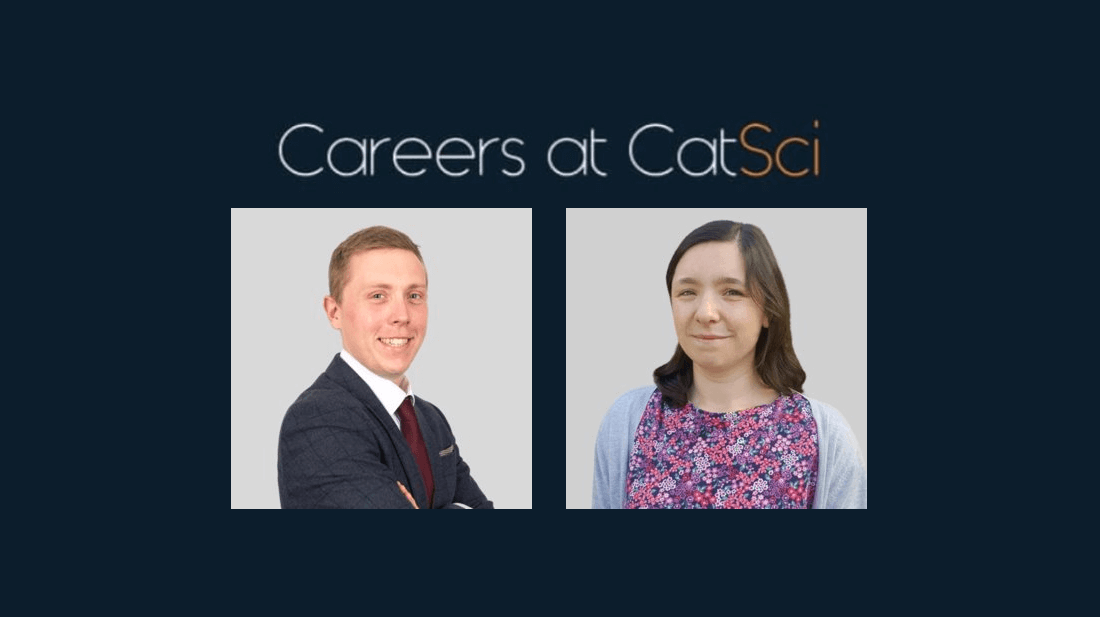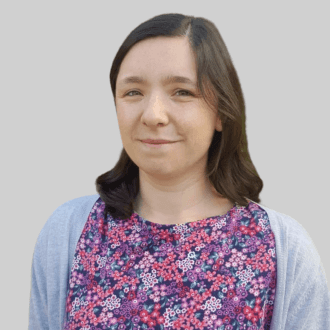
A Conversation with our Team Members
Have you ever wondered what it’s like to work at CatSci? Our Careers at CatSci series offers a peek into the everyday lives of the CatSci team. For this edition of the series, we spoke with two of our scientists. Dr Charlotte Dalton joined the team in 2019, and Lloyd has been with us since February 2021. Read on to find out all about Lloyd and Charlotte, their career paths so far, and their everyday routine as a CatSci scientist.

Dr Charlotte Dalton (She/Her) is an Associate Principal Scientist at CatSci. Charlotte studied for an MChem degree in Chemistry with Industrial Experience at the University of Manchester. She did a years’ placement at AstraZeneca working in process chemistry, before completing her PhD in Synthetic Carbohydrate Chemistry. She joined the CatSci team in November 2019 as a Senior Scientist, before getting promoted to Associate Principal Scientist in October this year.

Dr Lloyd Murfin (He/Him) is a Scientist at CatSci. He received his Master’s Degree in Chemistry for Drug Discovery at the University of Bath, where he also went on to study for his PhD. He worked as a Postdoctoral Researcher for 9 months, before starting as a Process Development Scientist at CatSci in February 2021.
Describe a typical day in your role
Charlotte: As a project manager, my typical day involves organising the project work for my teams and supporting them where I can. I am responsible for the technical leadership of my projects and for communicating our progress with the customer; I’m often planning and thinking ahead about what steps need to be completed next and preparing project update reports to share with the customer in our meetings.
Lloyd: I start my day by planning – checking my calendar and working out how best to spend my time. Day-to-day this can vary quite a bit. Most of my time is spent in the lab, performing reactions from milligram to hundred-gram scale. Outside of the lab, my time is spent in project meetings, with clients, typing up experiment results, or in training sessions. If it’s a Friday, a group of us tend to leave a littler earlier to go climbing.
What is the working environment at CatSci like?
Charlotte: The working environment at CatSci is excellent, everyone is very friendly and pleasant. Even when there are problems, I know I can rely on my team to make the best of any situation and help me out where needed.
Lloyd: The environment is quite fast paced, but this can vary depending on the turnaround needed for particular experiments or results. One of the best parts of the job is the people I work with. Everyone is very friendly and sociable, and the differences in everyone’s backgrounds means we all bring something new to a project. As a result, I learn a lot by just discussing a problem with other colleagues.
What element of your work do you enjoy most?
Charlotte: The element of work that I enjoy the most is talking to our customers and sharing our results with them, as well as advocating the best way forward for their project. CatSci takes a collaborative approach to customer interactions; it’s great to feel that we can work with the customer as an extension of their own skills and capabilities. This ensures we always contribute meaningfully to their development programmes.
Lloyd: The most satisfying part of my job is being able to provide an elegant solution for a problem – there is a real sense of achievement in problem solving.
When did you realise you wanted a career in this sector and what steps did you take to get there?
Charlotte: I first decided to become a chemist when I was around 10 years old! I always enjoyed science and maths at school, and I read lots of books about science. After my A levels I went to university for my MChem degree in Chemistry, it was during this time that I did a placement in process chemistry at AstraZeneca. After going on to complete my PhD in chemistry, I decided to return to process chemistry and during my first post-PhD role, I was able to interact a lot with customers; this led to my interest in project management and leadership.
Lloyd: I took chemistry at A level because I was told it was good to study science. Unintentionally, I then started to really enjoy it! I remember doing a case study on the drug artemisinin and finding the whole drug discovery process fascinating. I wanted to learn more about how such molecules were made, and be able to do that myself. I took a degree that let me explore the drug discovery process, and chose as many modules as I could that focussed on organic chemistry.
What are your career aspirations?
Charlotte: My career aspirations are to continue to grow as a project manager and to work towards a more senior leadership position in the business. In this way, I think I can use my skills to contribute to the growth of the business and to ensure CatSci continues to be a valued partner to our customers, and a great place to work.
Lloyd: To spend my working week doing something that I gain satisfaction from.
What are some of your career highlights or your most proud moment to date?
Charlotte: The highlights of my career have been when I have developed processes which have been implemented on scale and delivered for the customer. In addition, I am very proud of the mentoring and coaching I have provided to other scientists in order to help them improve and grow.
Lloyd: A regular highlight for me is when I can feedback to a client on some great work we have done, and generate a good discussion of where we need to go next. I really enjoy it when there is a feeling that I am making an impact in what I do. At CatSci, there is emphasis on working alongside our customers to offer our expertise of where we think a project would be best lead next. I feel a sense of pride in knowing that I am making a positive improvement.
What advice would you give to someone considering a similar career path?
Charlotte: My advice would be to take every opportunity you can get to grow and to challenge yourself, and to find managers and mentors who will let you do that.
Lloyd: Process chemistry isn’t something that’s usually taught about or discussed at university level, and can differ quite a bit from standard medicinal chemistry. I would suggest trying to get as exposed to it as possible – attending webinars, applying for placements, or generally reading up on it. It offers a really important place in getting a drug to market, and there is a lot to consider when needing to alter a drug’s synthesis from lab scale to plant scale.
What advice would you give to your younger self?
Charlotte: The advice I would give is to be more confident and know your own strengths (and weaknesses!). If you believe you can do something, fight for your opportunity to do it.
Lloyd: Most undergraduate courses offer the option to do a year in industry, and I wish I had taken that opportunity. Exposure to chemistry at an industrial level really changes the way you think about it.
Last year, CatSci celebrated its 10th birthday. What do you think is in store for CatSci in the next 10 years?
Charlotte: In the next 10 years, I think CatSci will continue to grow and expand our capabilities, I would be surprised in 10 years if it is actually possible to remember what the business was like in 2021! As we grow, I believe we can continue to keep our same strong relationships with customers and great culture – the main thing that will change is there will be more people, and more cake!
Lloyd: CatSci has grown considerably in the last ten years, opening a new site in Dagenham and expanding the Cardiff site year on year. I fully expect the CatSci name to grow further, and I wouldn’t be surprised to see multiple newer sites across the country to accommodate this growth.
Are you interested in joining the CatSci team? You can find our current vacancies here
Take a look at the rest of our Careers at CatSci series here.